best food for health

best food for health
11 Healthy SUPER Foods To Eat After 40+
Intro
Hi there viewers. as we age, our nutritional needs evolve. Once we cross the 40-year threshold, our bodies go through a lot of changes, such as a weakening immune system, bone or muscle loss, poor eyesight and impaired memory, although these changes may seem scary at first, by focusing on proper diet and lifestyle changes, you may easily enhance your health and vitality. In today’s bloge we’ve explored 11 foods that are Health. Always consult a dietician or a healthcare adviser before making any changes to your diet or if you have any concerns about certain foods and their benefits. Without any further delay.
1.Blueberries
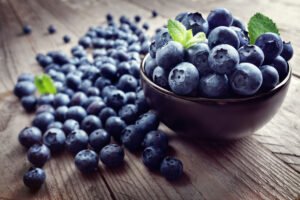
frozen blueberries, organic wild blueberries
blueberry vodka, blueberry plants
Blueberries are known their High antioxidant content, especially wild blueberries. These antioxidants, such as enociins, help neutralize free radicals, which may damage cells and increase the risk of diseases like cancer and heart disease, which may prevail when you hit 40. Antis in are particularly effective in reducing the risk of heart disease, mortality, type 2 diabetes, and age related brain degeneration. Arthritis, a common condition in older adults, causes joint pain and stiffness. A study involving 63 people with osteoarthritis of the KN found that consuming 40 G of freeze dried blueberry powder, equivalent to two one cup servings of fresh blueberries, daily for 16 weeks led to improvements in pain, stiffness, and difficulty performing daily activities. If you think ananin are the only magic ingredient in blueberries, you are wrong. This superfood also contains elements that help people beat the impact of old age on their eyesight. These berries contain antioxidants like luttin and vitamin C, which have been been shown to lower the risk of chronic eye diseases and conditions such as age related macular degeneration, cataracts glycom and drier Eyes.
2.Salmon fish
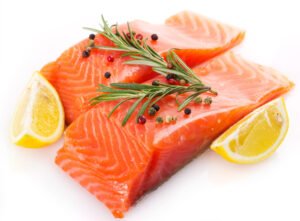
wild caught salmon, salmon fish
frozen salmon, grilled salmon
salmon for sale, cooking salmon
cedar plank salmon, salmon steaks
Salmon fish such as salmon should be a must have in a healthy diet chart, no matter what age you are. But most importantly, in your 40s, you should rely on to soothe your heart. Salmon is rich in omega-3 fatty acids, which are unsaturated fats known for their heart protective properties. These fatty acids May lower inflammation in the body, reducing damage to blood vessels. A clinical study involving non-obese, healthy adults aged 20 to 55 who consumed 125 G of salmon daily for 4 weeks showed significant cardiovascular benefits. There was a 4% reduction in blood pressure; a 15% decrease in triglyceride levels; a 7% drop in LDL cholesterol; and a 5% increase in HDL cholesterol. These changes suggest an estimated 25% reduction in coronary heart disease risk. Apart from that salmon also contains potassium which AIDS in controlling blood pressure and preventing fluid retention. This contributes to reducing heart rated conditions like heart attacks, strokes, arhythmia, and high blood pressure. But how much should you consume this fatty fish? according to experts, the recommended amount is at least two servings per week, where a serving size is considered to be 4 o or 100 G.
3.Nuts for health
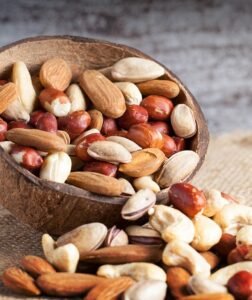
walnuts benefits, almonds benefits
best nuts for weight loss,
health benefits of walnuts, health nut
healthy nuts for weight loss,
Nuts are rich in protein and fiber, two nutrients that are extremely essential to maintaining a healthy body in midlife. They increase satiety and help keep you feeling full . This may lead to a reduced intake of calories overall. The high fiber content also aids in digestion or may help maintain a healthy weight. Peanuts, for example, may increase levels of peptide y y, a hormone that reduces appetite and increases feelings of fullness. This means you might end up consuming fewer calories due to a reduced appetite. In addition to that another Well celebrated nut almonds has been found to lower LDL cholesterol and diastolic blood pressure. According to studies consuming more than 42 G or about 1 and2 o z of almonds daily May significantly reduce body mass and fat Mass compared to control diets. Almonds are also a rich source of unsaturated fats and magnesium which are beneficial for heart health and metabolic processes both of which often get disbalanced in older age.
4.Leafy greens nutrition
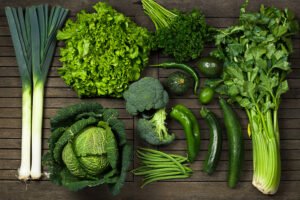
eating kale daily, leafy diet
leafy green nutrition, kale spinach benefits
mustard green nutrition,
Leafy greens green vegetables act as a savior protecting our overall health throughout our lives. They are packed with essential nutrients such as Vitamin A vitamin C antioxidants fiber fate vitamin K magnesium calcium iron and potassium for maintaining various bodily functions smoothly. Spinach a specific type of leafy green exemplifies the health benefits of these vegetables. It contains phytochemicals and bio actives that scavenge reactive oxygen species and modulate gene expression related to metabolism and inflammation. Leafy greens are typically low in calories making them an ideal food choice for weight management and maintaining a balanced diet. A comprehensive narrative review highlighted that fruits and vegetables including leafy greens play a role in reducing inflammation leading to decreased premature mortality and morbidity. The review suggests that consuming around 800 G per day of fruits and vegetables particularly leafy greens may have strong preventive effects against cardiovascular diseases.
5.Health benefits of avocado
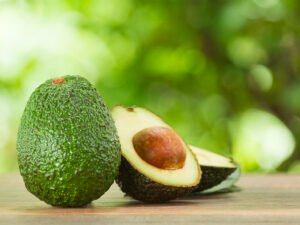
benefits of avocado, health benefits of avocado
nutritional value of avocado, benefits of eating avocado avocado and diabetes, avocado nutrition benefits avocados good for you, eating avocado everyday
Avocados be it a toast staple or a nutritional salad avocados are always boosting best health through their nutrient content. It supports gut health mainly through high fiber. Avocados contain pectin which creates an environment that is allows probiotic bacteria such as lactobacillus to thrive in the harsh gastric juices supporting the colonies of good bacteria in outnumbering harmful bacteria. A total of 163 adults between the ages of 25 and 45 who had a body mass index equal 2 or greater than 25 were involved in a study that lasted for a period of 12 weeks. Their meals were either normal or included 175 G of avocado for men and4 G for women every day. The people in the avocado group had more types of bacteria in their guts and more of certain good bacteria. The feces of this group also had higher amounts of some fatty acids but lower amounts of two bile acids.
6.Quinoa for health
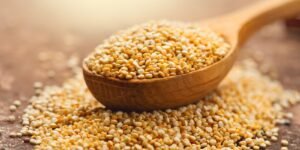
healthy salad with quinoa, healthy food with quinoa
health facts about quinoa, health benefits of red quinoa
health benefits of sprouted quinoa, quinoa for health
health benefits of quinoa, quinoa good for diabetics
Quinoa when you turn 40 your muscles may start to get weak and your arms and legs may lose strength.Another superfood quinoa is a complete protein meaning it contains all nine essential amino acids which are crucial cral for muscle building and repair .1 cup of cooked quinoa provides about 8 g of protein which includes the amino.Acid Lucine promoting muscle repair and anabolism aside from that quinoa contains secondary metabolites that have been shown to regulate protein turnover in muscle cells including both protein synthesis and degradation.This regulation occurs through various signaling Pathways which play a critical role in muscle cell function especially in conditions like sarcopenia which is characterized by the loss of muscle mass and strength.For bodybuilders or those engaged in intense physical training protein requirements are higher than average.A bodybuilder typically needs around 2 g of protein per kilogram of body weight.Incorporating quino into their diet may help meet these increased protein needs.
7.Greek yogurt for health

healthy Greek yogurt, light and fit nutrition facts
health benefits of Greek yogurt, yogurt for diabetics
benefits of eating Greek yogurt, the best healthy yogurt
Greek yogurt good for you, Greek yoghurt probiotic
Greek yogurt muscle strength is not the only loss your body experiences at the age of 40 your bones also get weaker. That’s why you should be adding Greek yogurt due to its Rich nutrient profile and its role in promoting bone formation and reducing bone breakdown. Greek yogurt is an excellent source of nutrients such as protein calcium phosphorus and magnesium collectively enhancing bone density. A higher intake of it has been associated with a lower risk of osteoporosis especially in older adults. This may include 3 and 1/2 cups of Greek yogurt daily. a study involving young adult males who engaged in high impact exercises for 12 weeks while consuming Greek yogurt found positive effects on bone health. Those who consumed Greek yogurt containing 20 g of protein and 28 mg of calcium per dose showed a greater increase in bone formation markers and reduced bone breakdown especially when combined with exercise.
8.Sweet potatoes nutrition

sweet potato nutrition facts, nutritional value of sweet potatoes
vitamins in sweet potatoes, fiber in sweet potato
benefits of eating sweet potatoes, potato benefits
sweet potato is good for diabetes,
Sweet potatoes during old age another healthy shoe that we all may experience is losing our eyesight. Hence it is extremely important to add foods like sweet potatoes due to their Rich nutrient composition. Particularly in antioxidants vitamins and minerals that may be beneficial for Eye Health.Sweet potatoes are packed with carotenoids such as beta carotene. it is converted to vitamin A in the body which is vital for night vision and overall Eye Health. A large sweet potato contains over 173 micro G of vitamin a which is almost 200% of the recommended intake. Furthermore sweet potatoes are rich in luten and zenin which are known to protect the eyes from age related macular degeneration and cataracts. At concentrations ranging from 10 to 1,000 microgr per milliliter test tube Studies have revealed that the anthocyanins which are abundant in sweet potatoes that they offer have the ability to safeguard eye cells from damage. Thus it may have a significant impact on on our overall Eye Health.
9.Olive oil benefits

olive oil benefits, healthiest olive oil
best olive oil for health, health benefits of olive oil
the best olive oil for health,
best olive oil for health polyphenols,
best olive oil for cholesterol, olive oil nutrition facts
Olive oil a key component of the Mediterranean diet is needed in your life to protect you from the adverse effects of older age.Olive oil contains a high percentage of monounsaturated fats which are known to lower bad LDL cholesterol and increase good HDL cholesterol.Substituting unhealthy fats like margarine butter mayones and dairy fat with olive oil may lead to a lower risk of heart diseases such as atherosclerosis.A comprehensive study involving about 61,000 women and 32,000 men free from cancer heart disease and stroke demonstrated that higher olive oil intake was associated with a 14% lower risk of cardiovascular disease and an 18% lower risk of coronary heart disease.This was observed over a 24-year follow-up period highlighting the oil’s significant role in reducing heart disease risks.
10.Eggs nutritional value
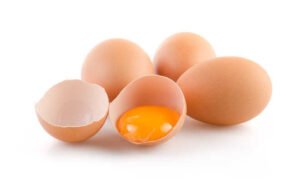
benefits of eggs, are eggs good for weight loss
are eggs healthy for you, health benefits of eggs
nutritional value of eggs, healthy eggs
benefits of eating eggs, best olive oil for cholesterol,
Eggs are one of the most common food items which never fails to amaze us due to their health benefits.They contain vitamin D A nutrient essential for bone health immune function and cell signaling which is important to prevent depression a weakened immune system and diabetes.In addition to that eggs are vital for brain health due to B vitamins including B12 B6 and folet and Coline. Coline is essential for memory cognitive function and reducing the risk of dementia.Moreover it plays a critical role in early brain development especially during pregnancy.Limited consumption such as about one egg per week was associated with slower memory decline in late life compared to consuming little to no eggs according to studies.
11.Whole grains benefit of eating brown rice
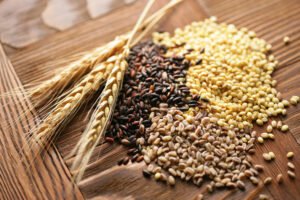
healthy grains to eat, healthiest grains for weight loss
best grains for weight loss, brown rice for weight loss
healthy whole grain foods, amaranth grain benefits
benefit of bulgur, benefit of eating brown rice
Whole grains when we are talking about healthy food whole grain takes a spot .Consuming more of it is linked to a lower risk of cardiovascular disase disease type 2 diabetes and certain cancers as well as a lower mortality rate from these conditions.The effects on the microbiota in the gut could be partially responsible for this. whole grains contain both digestible and indigestible carbohydrates indigestible carbohydrates.Such as dietary fiber resistant starch and oligosaccharides Escape digestion in the small intestine and are fermented in the gut.This fermentation process produces short chain fatty acids which lower colonic pH and serve as an energy source for colonocytes. these fatty acids may also alter blood lipids and provide immune protection beyond the gut.This Improvement in the gut environment due to whole grains is crucial for maintaining digestive health and overall well-being.
Leave a Reply